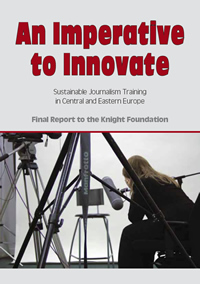REPORT DESCRIPTION
Serious efforts at media development in Eastern Europe have been under way since the fall of the Berlin Wall in 1989. Despite long-running efforts, there still exists a great need for media development assistance. This report aims to offer a modest contribution to the larger global effort to reflect upon and improve independent media development and to take account of initial experiences and act on innovative opportunities for moving forward. It does this by showing how media development promotes market-based democracy, examining the role of Central and Eastern European journalism training centers in media development and recommending ways that donors can more effectively approach the media environment in Central and Eastern Europe and beyond.
Serious efforts at media development have been under way since the fall of the Berlin Wall in 1989. Despite long-running efforts, there still exists a great need for media development assistance. This report looks at current conditions and answers the following questions:
-
What opportunities exist to bolster strong, independent media in Central and Eastern Europe?
-
What are the successful strategies for sustainable journalism training in Central and Eastern Europe?
-
What should the role of private foundations be in the support of journalism development in Central and Eastern Europe?
Approach: The evaluation draws on analysis of and interviews with individuals working in media development, journalist training centers and activities and several current models of sustainable media training in the Czech Republic, Slovakia, Hungary and Romania.
Report Partner: This report was produced by Aaron Presnall of the Jefferson Institute for Knight Foundation.
REPORT FINDINGS
-
Building Market Democracy through Media Development – free media, and its impact on improving accountability and democracy, has a significant impact onpromoting democracy.
-
Journalist Training Centers – Despite the need for media training, media training centers, which have played an important role in the early transition period of Central and Eastern Europe, are financially unsustainable and can be replaced by more effective on the job training.
-
Models of Sustainable Journalism Training – Options include the generation of local income from fee-based training and media-related activities, cross-subsidizing local operations with revenue from international training, or a focus on niche reporting.
-
Recommendations – Improved coordination of donors is critical, especially between Northern European and Anglo-Saxon donors. Models for public-private funds for pooling public and private European and U.S. donor resources for re-granting and lending to support innovation in training and transformational change of media in Central and Eastern Europe are readily available.
-
Conclusions – Private foundations have an opportunity to serve as a transformational catalyst for the construction of a large multilateral public-private re-granting or lending vehicle for support of journalism development in Central and Eastern Europe.
